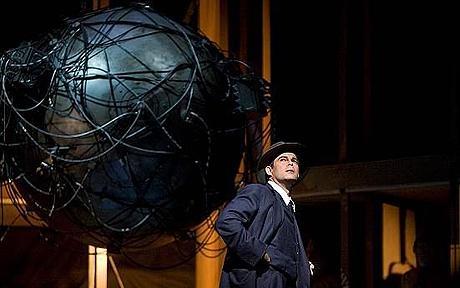Among the most astonishing moments in John Adams's new opera Doctor Atomic (currently running at the English National Opera) is an aria at the end of the first act. The eponymous brains behind the Manhattan Project, Dr J. Robert Oppenheimer, stands alone on stage with his new creation, a spherical A-bomb coated in wires and tubes like a patient in intensive care, and sings John Donne's holy sonnet "Batter my heart, three-person'd God".
I say sings. It's really more of an explosion of anguish, rage and self-loathing, spat out with desperation, Gerald Finley superbly transforming this self-contained, supremely confident man of science into a wreck.
Doctor Atomic is a class act. It works in the manner of an oratorio or cantata, weaving philosophical ideas, intellectual arguments and psychological outbursts around a simple framework, the build-up of tension at the Los Alamos scientific compound as it prepares for the first atomic tests. Julian Crouch's sets impressively stack the declamatory chorus of scientists like they were saints in a medieval fresco. Underneath them, director Penny Woolcock allows the intense mundanity of daily life to play itself out simply, realistically, as the leading pack of scientists and army personnel slowly buckle under the strain of it all.
Characters are finely etched: Brindley Sherratt's sarcastic physicist Edward Teller, Thomas Glenn's whinny physicist Robert Wilson, Jonathan Veira's self-obsessed General Groves. The love story between Oppenheimer and his wife Kitty (Sasha Cooke in fine voice) is less successful, harbouring some crazily awful lines - "my eyes splitting the skull to tickle your brain with love". And there's still too much of Pasqualita, Kitty's hefty American Indian serving girl, and her Mystic Meg visions. But at least Adams knows it; he trimmed her part down since the opera was performed in Chicago two years ago. Conductor Lawrence Renes delivers a polished performance of what is one of Adams's finest scores to date.















Add comment